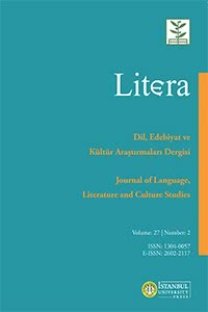W. H. Auden’ın Şarkılarında “Mizahi Şiir Ciddi Olabilir”
Bu çalışma, Auden’ın üç farklı dönemini temsil eden “On iki Şarkı,” “Beş Şarkı” ve “İki Don Kişot Güzellemesi” adlı şiirlerinde şiir kişilerinin yaşadığı umutsuzluk ve endişe hislerini incelemektedir. Eliot kuşağının son temsilcisi olarak Auden, sorunlu uyum sağlama sürecini şiirleştirir. Diğer bir deyişle, erken dönem şiirlerinde yansıtılan merkeze yaklaşıp merkezden uzaklaşmanın bıktırıcı deviniminden sonra şairin huzura kavuştuğu söylenebilir. Şiirlerin tartışılmasından önce çalışma, Auden’ın hayatının şairliğine nasıl bir etkisi olduğu üzerine kısa bir değerlendirmede bulunur. Auden’ın hayatındaki başlıca konu veya sorunların seçilen şiirlerde ne derece görünür olduğu da çalışmanın ana tartışmalarından birini oluşturur. Tartışmanın diğer odak noktasıysa şiirlerin imgeler yoluyla Auden’ın yaşadığı ve başka bir şiir derlemesinin adını da oluşturan “Kaygı Çağı”nı çarpıcı bir şekilde yansıttığıdır. Üç farklı dönemindeki “şarkılar,” Auden şiirindeki değişmez ümitsizliği yansıtır. Ancak, aşk ve doğa gibi çeşitli belirleyici unsurlarla yitirilen bağlantının farkındalığı, Auden’ın son şiirlerinde mütevazı bir kabullenmişliğe evrilir. Seçilen şiirler, din ve anamalcı anlayış üzerine belirli imalar taşımanın yanında aşk, yalnızlık ve kent soylu değerleri işlemesi bakımından benzerlikler taşımaktadır. Sonuç olarak, erken, geçiş ve son dönemlerinden seçilen şiirler, şairin karmaşık ‘huzur’ düşüncesini yansıtmanın yanında hem kavuşma hem de ayrılık şarkıları olduğundan Auden şiirini herhangi bir genellemeye indirgemenin sorunlu olduğunu gösterir.
“Light Verse Can Be Serious” in the Songs of W. H. Auden
This study evaluates Auden’s “Twelve Songs” (1935-38), “Five Songs” (1948-53), “Two Don Quixote Lyrics” (1963) representing three different periods in the Auden canon in order to discuss the senses of anxiety and desperateness felt by the poetic personas. As the last major voice of Eliot generation, Auden poeticizes his process of problematic uniformity. In other words, he feels at home after the harassing motion of centring and decentring reflected in his early poems. The songs from the different periods of Auden demonstrate the unchangeable nature of hopelessness in his poems. However, the awareness of a broken link with various defining factors such as love and nature evolves into a humble acknowledgement in Auden’s later works. Thus, the selected poems share a similar attitude towards the basic arguments of love, loneliness, and bourgeoisie values besides the political implications on capitalism and religion. In conclusion, the analysis of “Twelve Songs,” “Five Songs” and “Two Don Quixote Lyrics” from his early, transition and later periods suggests that Auden’s poetry cannot be reduced into any formula and reflects his problematic perception of ‘peace’ as the poems waver between the songs of reunification and those of separation.
Keywords:
W.H. Auden, twelwe songs, Five Songs Two Don Quixote Lyrics,
___
Alvarez, A. (1958). Stewards of excellence: Studies in modern English and American poets. New York: Scribner.Auden, W. H. (1945). The collected poetry of W. H. Auden. New York: Random House.
Auden, W. H. (1977). Light verse. In E. Mendelson (Ed.), The English Auden, poems, essays and dramatic writings 1927-1939 (pp. 363-368). New York: Random House.
Auden, W. H. (1977). Psychology and art to-day. In E. Mendelson (Ed.), The English Auden, poems, essays and dramatic writings 1927-1939 (pp. 332-342). New York: Random House.
Auden, W. H. (1994). Collected poems. In E. Mendelson (Ed.). London: Faber and Faber. Auden, W. H. (1995). Poems. New York: Random House.
Auden, W. H. (2005). Introduction to The Oxford Book of Light Verse. In S. Gupta & D. Johnson (Eds.), A Twentieth-century literature reader: Texts and debates (pp. 66-71). New York: Routledge.
Auden, W. H. (2015). Introduction to the sonnets by William Shakespeare. In E. Mendelson (Ed.), The Complete works of W. H. Auden (pp. 92-106). Princeton, NJ: Princeton UP, 2015.
Barthes, R. (2007). Criticism and truth (K. P. Keuneman, Trans.). London and New York, Continuum.Bozorth, R. (2001). Auden’s games of knowledge: Poetry and the meanings of homosexuality. NY: Columbia UP.
Bozorth, R. (2004). Auden: Love, sexuality, desire. In S. Smith (Ed.), The Cambridge companion to W. H. Auden (pp. 175-187). Cambridge: Cambridge UP.
Bucknell, K. (1994). W. H. Auden juvenilia. Princeton, NJ: Princeton UP.
Davenport-Hines, R. (2004). Auden’s life and character. In S. Smith (Ed.), The Cambridge companion to W. H. Auden(pp. 15-24). Cambridge: Cambridge UP. Eliot, T. S. (1963). Collected Poems 1909-1962. New York: Harcout, Brace & World.
Emig, R. (2000). W. H. Auden: Towards a postmodern poetics. London: Palgrave.
Hecht, A. (1993). The hidden law: The poetry of W.H. Auden. Cambridge, Mass.: Harvard UP.
Hoggart, R. (1951). Auden: An introductory essay. London: Chatto & Windus.
Hoggart, R. (1966). W. H. Auden. London: Longmans, Greens.
Jacobs, A. (1995). Auden’s local culture. The Hudson Review, 47(4), 543-568.
Mendelson, E. (1977). Preface. In E. Mendelson (Ed.), The English Auden, poems, essays and dramatic writings 1927-1939 (pp. 13-23). New York: Random House.
Mendelson, E. (2017). Early Auden, Later Auden: A critical biography. Princeton: Princeton UP.
O’Neill, M. (2007). The 1930s poetry of W. H. Auden. In N. Corcoran (Ed.), The Cambridge companion to Twentieth-century English poetry (pp. 105-116). Cambridge: Cambridge UP.
Raichura, S., & Singh, A. (1975). A conversation with W. H Auden. Southwest Review, 60(1), 27–36.
Rodway, A. (1984). A preface to Auden. London and New York: Longman.
Sasidharan, K. P. (1991). Poets in a changing world: A study of the progressive movement in poetry. Delhi: Konark.
Sharpe, T. (2007). W. H. Auden. Oxon and New York: Routledge.
Spears, M. K. (1963). The poetry of W. H. Auden: The disenchanted island. New York: Oxford UP.
The Bible (Authorized King James Version). (2008). New York: Oxford UP.
Wordsworth, W., & Coleridge, S. T. (1991). Lyrical ballads. In R. L. Brett & A. R. Jones (Eds.). London and New York: Routledge.
Yeats, W. B. (1956). The collected poems of W. B. Yeats. New York: Macmillan.
- Yayın Aralığı: Yılda 2 Sayı
- Yayıncı: İstanbul Üniversitesi
Sayıdaki Diğer Makaleler
Disguised Subjugation as Education: Colonial and Maternal Pedagogy in Jamaica Kincaid’s Lucy
Teleological Trajectory of Subjection: A Critique of Marlovian Heroes
Charles RICE-DAVIS, Mia NAKAYAMA
Mizahî Ögelerin Çevirisi Üzerine Bir İnceleme: Bir Noel Gecesi Örneği
Varoluşçu Özgürlük Bağlamında Kadın: Simone de Beauvoir ve İkinci Cinsiyet
